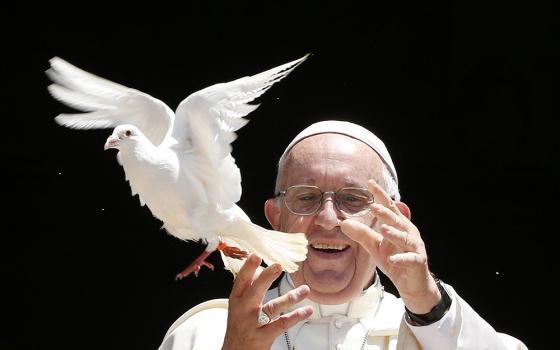
Jazmin Cazares, 17, right, the sister of Jackie Cazares, who was killed in the May 24 mass shooting at Robb Elementary School in Uvalde, Texas, gets a hug from Mary Morales of Kyle, Texas, June 11 during a March for Our Lives rally in Austin, Texas, one in a series of nationwide protests against gun violence. (CNS/Reuters/Nuri Vallbona)
The year after I graduated from college, I completed a year of service through Volunteers for Educational and Social Services, or VESS, an organization of the Texas Catholic Conference. VESS, founded in 1972, placed young adults in economically under-resourced parishes, schools and social service agencies throughout Texas, although most volunteers were non-Texans. In fact, in my cohort of volunteers I was the only Texan. Unfortunately, due to lack of funding and decreased volunteer enrollment, Volunteers for Educational and Social Services discontinued operations in 2001.
I lived in community with four other women who were also recent college grads and we worked in a small, Catholic grade school in a small Texas town none of us had previously heard of. Needless to say, we learned a lot from serving at Sacred Heart Catholic School that year. Only one person in my community had studied education in college. The rest of us were clueless — kindhearted, but clueless.
We learned from one another the importance of laughter, shared tears, and supporting one another through difficulties. We learned from the community of faculty who embraced us and showed us compassion, a listening ear, and gave advice about being in the classroom. We learned from the students, from whom we received many hugs, saw lightbulbs of understanding go on, and to whom we listened. It was a year that changed my life. It is a place I could never forget and that will always hold a place in my heart.
Unfortunately, after last month, no one will ever forget the town. Before last month when I thought of Uvalde, I would remember the smiles of our students. The dance parties in our community house on cleaning days. The kindness of the families who gave so much from so little. The quinceañera celebrations that lasted into the night. Now, those memories are mingled with deep sadness and an undercurrent of rage as I consider how this small town has been forever changed.
I believe this tragedy, along with the horrors of other recent mass shootings, has changed all of us — whether we recognize it or not. I was in San Antonio a few weeks ago and chatted after Mass with a young woman who will begin her first year of teaching in August. She shared with me the main concern that she has as she prepares for this new chapter. Her primary concern is that her classroom is not designed well to keep children safe from an active shooter. This is her primary concern. Not lesson plans or curriculum. Not classroom management or discipline. But keeping her students safe from an active shooter.
Advertisement
I've noticed that in recent years, when I'm in public, I look around and am hyperaware. Either I look for a place to go or I try to map out a plan of action/escape in case there is a shooting. I do this in churches, at school, in crowded streets, restaurants, almost everywhere. I wouldn't say that I live in fear or that I dwell on safety plans. But I also try not to be naive about the possibilities.
And I wonder — what can we do with our collective trauma?
I don't have many answers. But I do know this. Doing nothing is not an option. We must do something. For it is in doing something that allows us to embody hope. If we throw up our hands and say that there is nothing we can do, we end up feeling defeated. And that feeling can lead to despair. And despair does not lead to change. It's a feedback loop of dead ends that perpetuates itself.
At times like this, I am reminded of our founder, Blessed Mother Adèle de Batz de Trenquelléon, who is quoted as writing: "Let us then courageously put ourselves to work, not letting ourselves be frightened by the greatness of the task. Let us think only of what we are doing at the moment, of doing it well. …" Courage! We need courage.
As we continue to face the traumatic events that keep happening around us, let never forget the victims. May their lives inspire us with courage to act. We have to.







